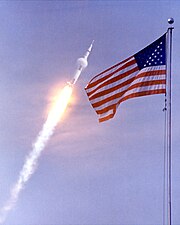Max q
Appearance

In aerospace engineering, max Q is the point of maximum dynamic pressure, the point at which aerodynamic stress on a spacecraft in atmospheric flight is maximized.
Considering the definition of dynamic pressure: , we have that such quantity:
- is zero at lift-off, when the vehicle's speed
- is zero outside the atmosphere, where the air density
- is always positive (or zero, as above) given the quantities involved
Therefore, there will necessarily be a point where the dynamic pressure is maximum: that point is precisely max Q.
In other words, below the max Q point, the effect of the spacecraft acceleration overcomes the decrease in density. Above the max Q point, the opposite is true.
During a normal Space Shuttle launch, for example, max Q is at an altitude of around 11 km (35,000 ft).[1] During a typical Apollo mission, max Q occurred approximately between 13 km and 14 km of altitude (43,000–46,000 ft).[2][3]
See also
References
- ^
Jackson, Douglas T. (2001-05-06). "Space Shuttle Max-Q". Aerodynamics Questions. AerospaceWeb.org. Retrieved 2007-02-12.
{{cite web}}: Check date values in:|date=(help) - ^
Woods, David (2005-08-21). "Apollo 8, Day 1: Launch and Ascent to Earth Orbit". Apollo Flight Journal. NASA. Retrieved 2007-02-14.
{{cite web}}: Check date values in:|date=(help); Unknown parameter|coauthors=ignored (|author=suggested) (help) - ^
Brandt, Tim (2004-10-29). "Apollo 16, Day One Part One: Launch and Reaching Earth Orbit". Apollo Flight Journal. NASA. Retrieved 2007-02-14.
{{cite web}}: Check date values in:|date=(help); Unknown parameter|coauthors=ignored (|author=suggested) (help)



